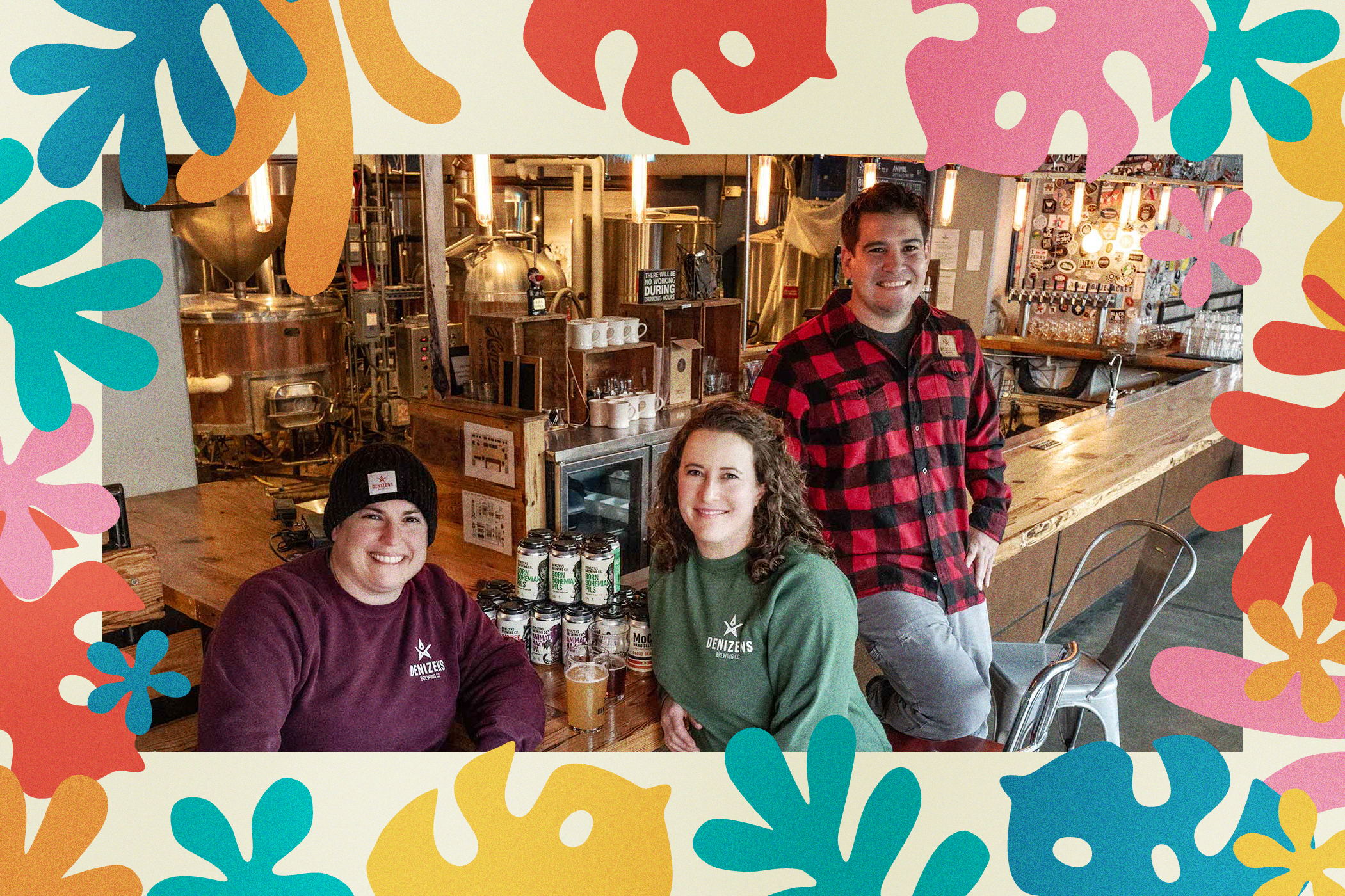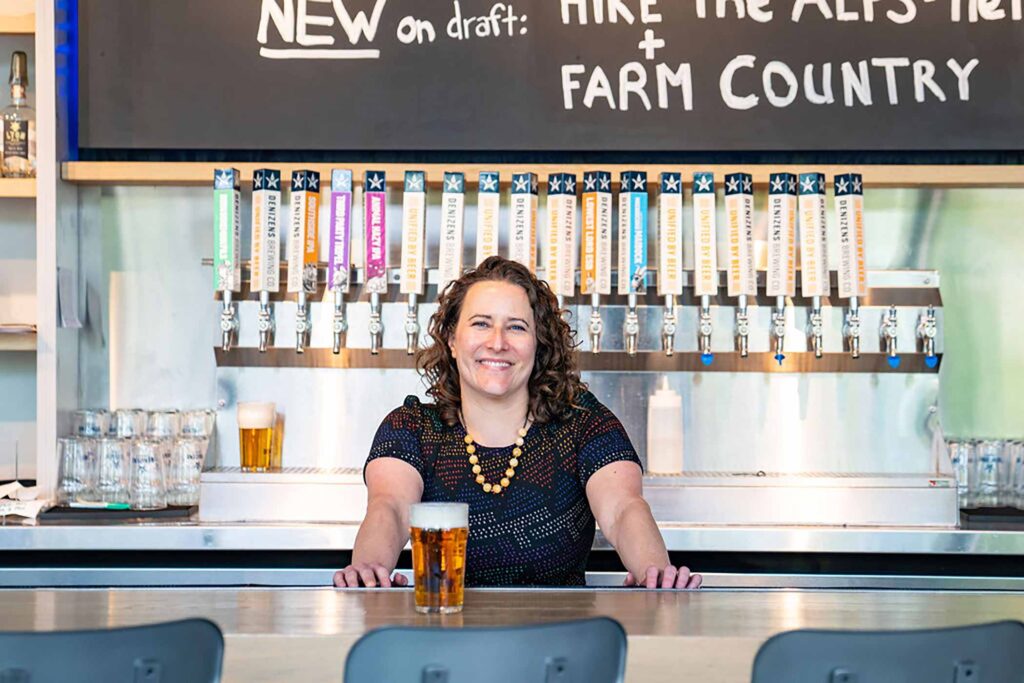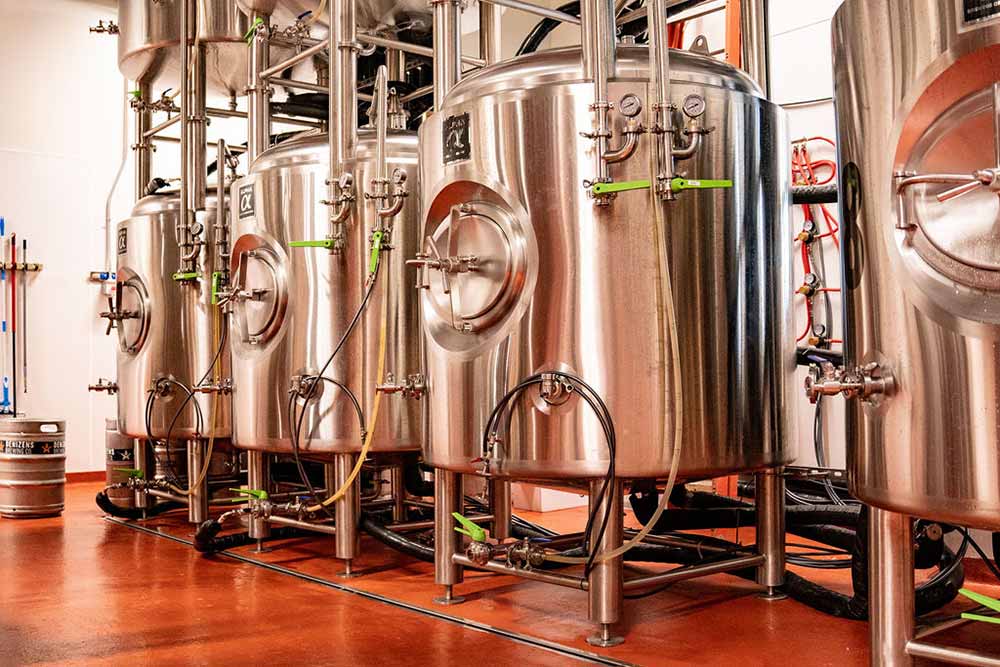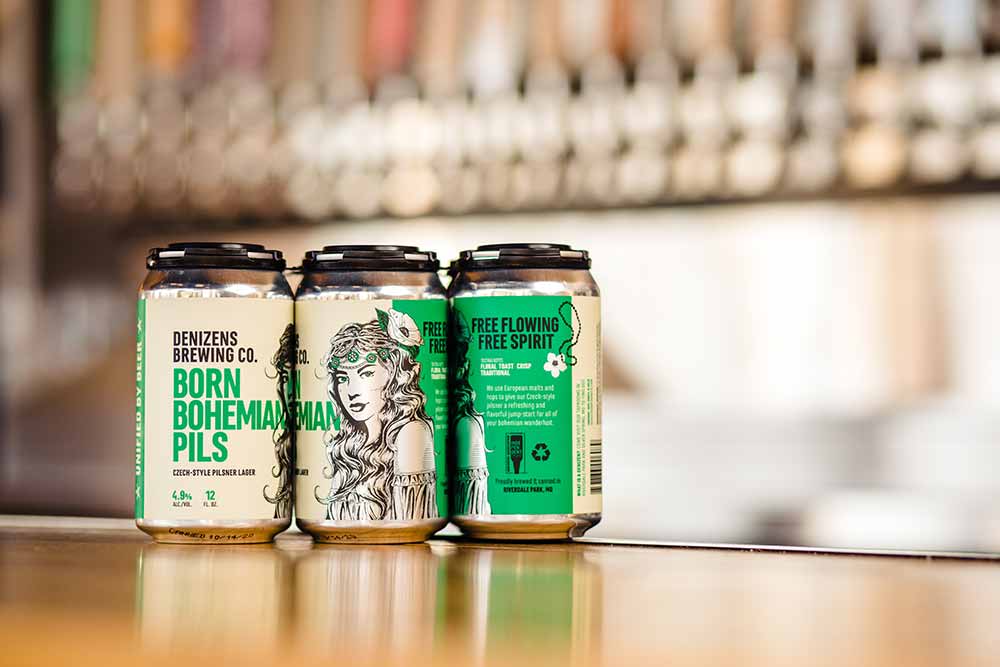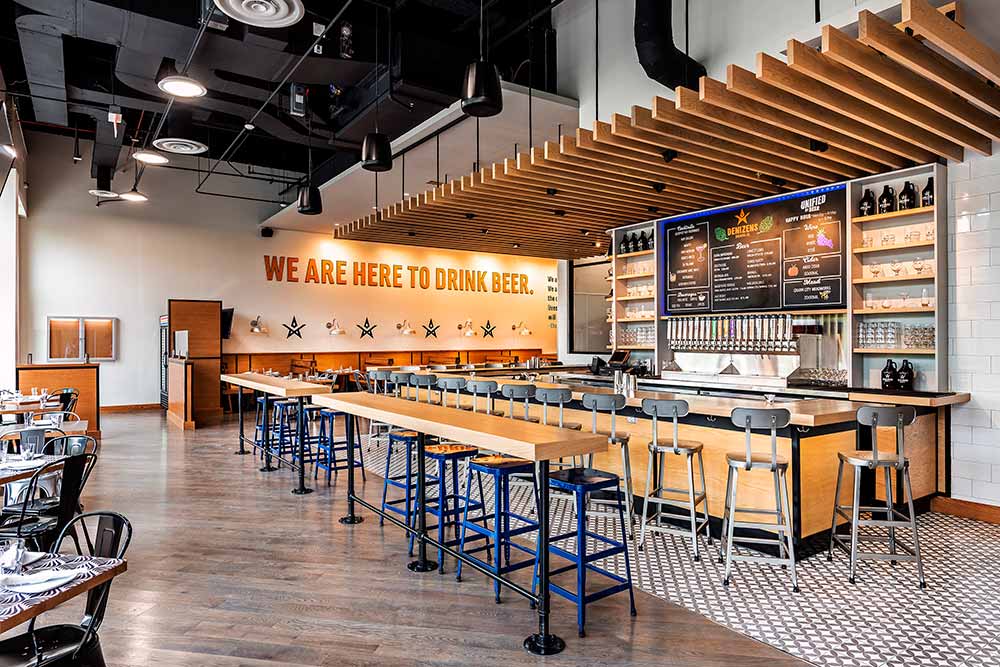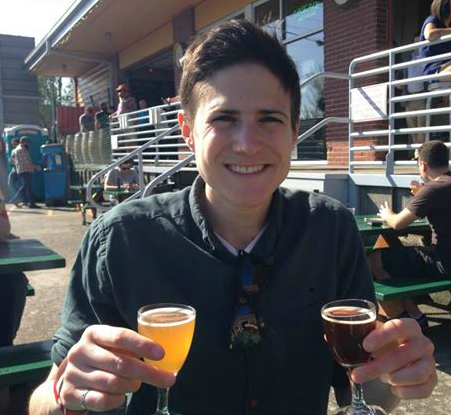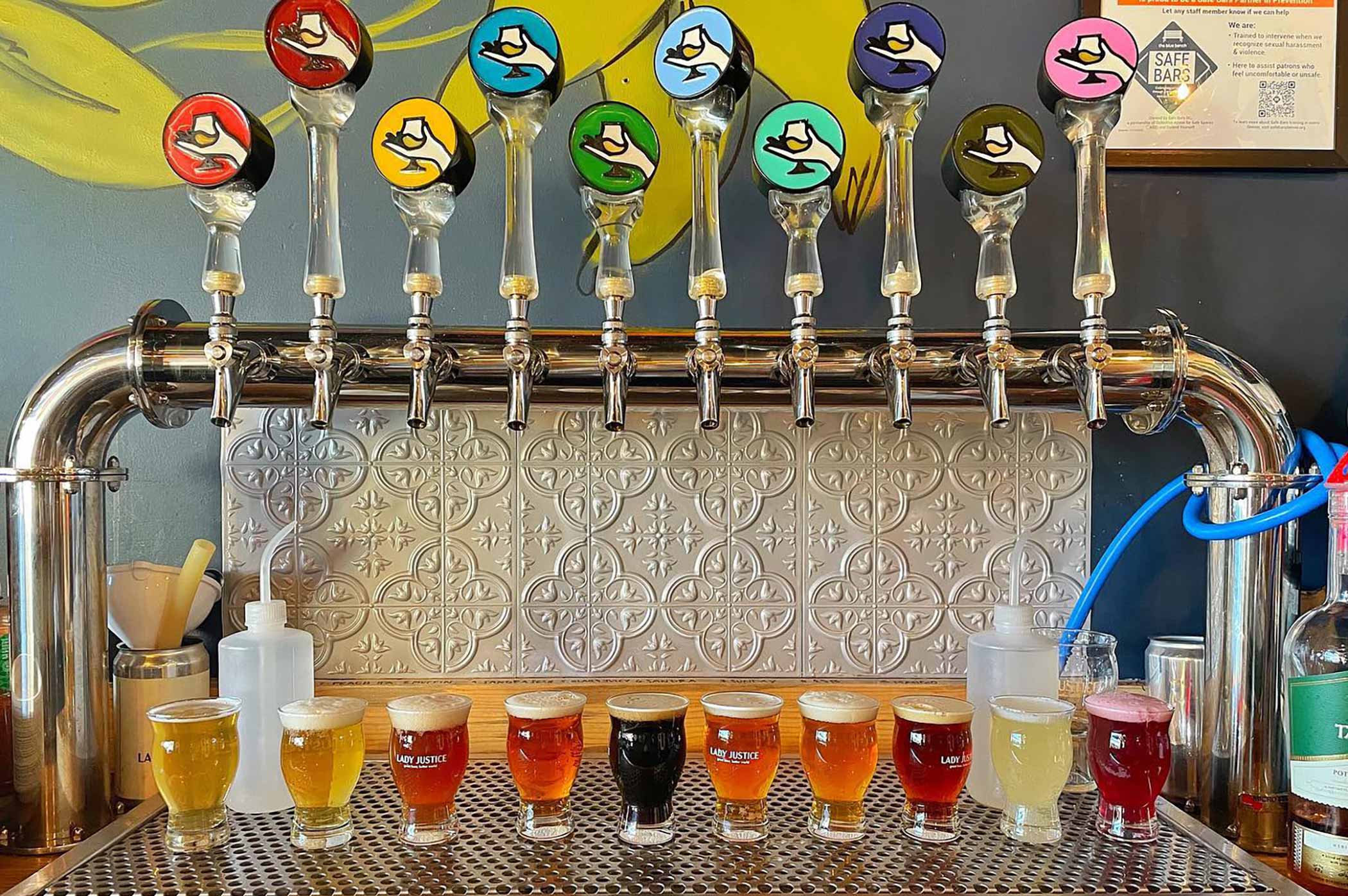Shop
Denizens Brewing: Fighting for Equality in Life, Law, and Liquid
One word: trailblazing.
Find Denizen’s Born Bohemian Pils along with 11 other beers in Hop Culture’s newest 2023 Queer Beer Box!
Get your box here!
Denizens Brewing Co. is a trailblazing brewery.
Seriously.
When wife-and-wife team Julie Veratti and Emily Bruno set out to start a brewery in Silver Spring, MD, in 2013, the laws didn’t allow them to open as a taproom/production space. Instead, they would have had to operate as a brew pub.
That wasn’t what Veratti and Bruno wanted to do.
And, if they wanted to distribute beer, they would have had to sell it to Montgomery County first, and the county would sell it to other licensees.
That didn’t jive well with the duo, either.
So they decided they’d try to change the laws.
Seriously.
They rallied, contacting local county council people, local council executives, and county executives to make their case. Veratti figured out what committee on Maryland’s Senate and House sides to target. “How do I get them to be supportive,” she says, arguing that changing the laws to favor the brewery would create jobs, increase tax revenue, create a community gathering place, and bring manufacturing back to areas it hadn’t been for decades.
Their strategy worked. Today, any brewery in Montgomery County benefits from Veratti and Bruno’s trailblazing work.
But honestly, this tracks. Because both are no strangers to breaking barriers.
GET DENIZENS IN OUR NEW BEER BOX
Denizens Brewing Founders Fighting For Equality in Life
Bruno and Veratti have always fought for what they believe. The two met in 2004 while on the campaign trail, trying to get John Kerry elected.
That same year in May, Massachusetts legalized same-sex marriage. In the early 2000s, Veratti joined MassEquality, an organization fighting to protect LGBTQ+ rights in the state. In four years, Veratti led the charge, turning 105 out of 200 legislators against same-sex marriage to 151 out of 200 for same-sex marriage.
Throughout a dozen constitutional conventions, multiple popular votes, and multiple election cycles, Veratti and MassEquality recorded a one hundred percent retention rate of all the elected officials that voted for same-sex marriage, a one hundred percent win rate on open seats, and defeated a majority of the people that voted against them.
“We were ruthless,” says Veratti, who ran the canvas office and organized those in the field. She recounts how they would go into neighborhoods, knocking on doors and handing people cell phones to call their local legislators on the spot to share their support of same-sex marriage. “I advocated for something I passionately believed in, which was same-sex marriage rights and just LGBTQ rights in general, making sure that our community was protected and respected and doing it in every way possible,” she says.
Sometimes she says her group would even show up in a legislator’s neighborhood, knock on all the doors around their house, and then actually call on the legislator, pretending they didn’t know them while conversing with them about LGBTQ+ rights.
It worked.
“We went from 105 against to only 49 against … from 95 people supporting same-sex marriage to 151 in just four years,” says Veratti.
So when the time came to open Denizens, and they ran into legal blockades, Veratti thought no problem, I’ve been here before; I’ll just change people’s minds.
Denizens Brewing Founders Fighting For Equality in Law
After working for MassEquality, Veratti went to George Washington University for her law degree. Later she worked for the Small Business Administration in the Office of Field Operations, traveling the country.
“It’s really hard to travel the country and meet all these totally badass small business owners that have built these things from scratch … and you can’t help but be inspired,” says Veratti, whose dad owned his own private practice for counseling and life coaching. “I understood working for yourself, how hard it is, and that you eat what you kill.”
Empowered by others and family, Veratti knew she wanted to eventually start her own small business and build something that brought people together.
At the time, no breweries existed in Montgomery County.
Veratti, who first started drinking after trying some of her dad’s Scottish beers (“which was kind of random because he’s not Scottish,” mused Veratti), found a perfect fit.
At a Christmas family dinner in 2012, Veratti and Bruno proposed opening a brewery to their brother-in-law Jeff Ramirez, who had been professionally brewing for some years in Colorado.
He said yes.
“We scraped together everything,” says Veratti.
Reaching out to thirteen banks, eleven outright wouldn’t entertain loaning the three any money. One brought Bruno and Veratti in for a meeting only to tell them, “I just want to start by telling you I’m not giving you any money at all,” recalls Veratti. “But I wanted to meet you because this was the most well-put-together business plan I’ve ever seen, and I thought I would meet you in person and let you know that you should try to pitch this to Shark Tank.”
When Maryland Community Bank finally funded the project, they only gave the pair $500,000 instead of the one million they needed.
“I don’t necessarily know if this was like, no banks would talk to us because we’re Queer-owned or we’re woman-owned or whatever, but we didn’t have those financial connections,” says Veratti. “We weren’t coming to the table with all that.”
The bank also gave them a contingency: “We will not give you this funding until you’re legally allowed to do the business model you want to do,” she says.
In 2014, in Montgomery County, MD, to open a brewery, you needed a brewpub license with a full-service restaurant, meaning you served fifty percent food and fifty percent alcohol.
“We just wanted to make beer and sell it to people,” says Veratti.
Additionally, if you wanted to distribute beer, you had to sell products to the county first, which would then sell them to other licensees. At the time, Montgomery County was the only jurisdiction to completely control alcohol distribution in the United States.
“We created the very first exception to that [rule],” says Veratti, meaning small breweries could bypass the county and sell directly to other licensees.
“How?” you might reasonably ask next.
From Veratti’s experience at MassEquality, she understood how legislative processes worked.
“First of all, you have to figure out where the law is jurisdictional, right?” says Veratti. She looked at who in the county could advocate for her and make introductions to the right people in the state “so that I can sit at the table with the right folks,” she says. “And then how do I get them to be supportive?”
By arguing that Denizens will create jobs, increase tax revenue, create a community gathering place, and bring manufacturing back where there hasn’t been any for decades.
Veratti says they got the whole Montgomery County delegation—both on the Senate and the House sides—to write a letter of support. “Even though the whole legislature across the state had to vote on it, they obviously are going to be pretty deferential if the whole delegation of that county is like, we want you to pass this,” says Veratti.
To get the bank to close on the loan, Veratti and Bruno even petitioned the governor of Maryland to sign the two amendments into law early. Usually, the Maryland legislature meets from January 15 to April 15, with the governor signing new regulations in July unless it’s an emergency bill.
“Obviously, this was an emergency to us, but this was not an emergency to the State of Maryland,” says Veratti.
But she hustled, cold-emailing people like the Chief of Staff to then-Governor Martin J. O’Malley and explaining Denizen’s situation.
“To my shock and surprise, [he] replied to me right away,” says Veratti. “I had somehow figured out his email just by putting together different combinations. And the governor signed a couple of days later, and we closed on the loan.”
For the last almost decade, those law changes have been insanely impactful to the culture of craft beer in Montgomery County. All because Veratti and Bruno stuck out their necks, paving the way for breweries to come despite sometimes being the only women and the only Queer folx in the room.
GET DENIZENS IN OUR NEW BEER BOX
Denizens Brewing Founders Fighting For Equality in Liquid
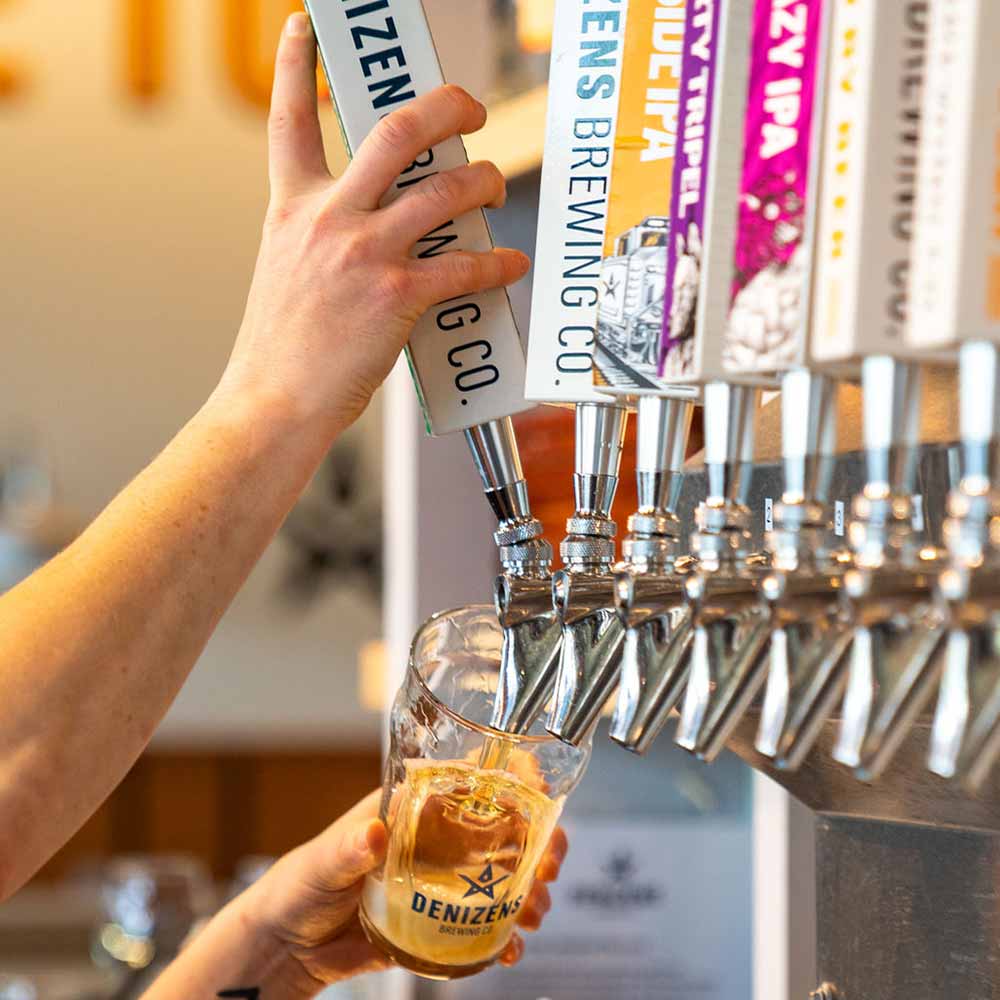
Denizens Brewing Co. opened a new taproom in Riverdale, MD, in 2019 | Photography courtesy of Denizens Brewing Co.
Although trailblazers, Denizens has “never been the cool kid, and I don’t think we ever will be,” says Veratti. “Part of it is that when you look at the people who decide [who the cool kids are], they’re not Queer women, right? It’s a bunch of straight white bro-y dudes, and they all bro out with each other.”
For Veratti, who is more masculine presenting, identifying as Queer and a woman can sometimes feel lonely. In charge of wholesale for Denizens, Veratti says when organizing events, she rarely works with other women, let alone Queer people.
“I’m the only woman on the call, and it’s a bunch of dudes trying to overtake the conversation,” she says. “At some point, you just have to puff your chest, pull up a seat at the table, and be like, I’m talking now, and you’re going to listen to me.”
Or, when talking to distributors, she’ll email someone to create a new relationship, and they won’t respond. But when Denizens Head Brewer and Co-Owner Ramirez sends something, they’ll reply immediately.
These small challenges wear on you.
“It’s frustrating not to get credit when you have done something and to be sort of ignored,” says Veratti. “That is kind of like the life of living in the world as a woman or as Queer; it just happens, right?”
Still, despite the cultural baggage, Denizens has continued to grow, opening a second taproom in Riverdale in 2019 and becoming a pillar and gathering spot for the community. Often hosting craft fairs, trivia, live music, a running club, and drag shows, Denizens embraces its Queer identity, giving back to specific LGBTQ+ organizations, such as the Human Rights Campaign, the Sexual Minority Youth Assistance League, and the MoCo Pride Center.
For Veratti, that’s how Denizens can impact the industry and local community. And it’s one of the reasons they’re participating in Hop Culture’s 2023 Queer Beer Box.
“I think doing things like what you’re doing with the [Queer Beer] box, where it brings people around the country together via beer, and you’re telling the stories of the beer … is a step in the right direction.”
Taking Pride in Brewing Something for Everyone
It’s crazy to us that anyone would overlook Denizens, because they make crazy good beer.
Like their Born Bohemian Pils, which you’ll find in Hop Culture’s Queer Beer Box 2023.
A true-to-style Czech pils, Born Bohemian Pils includes 100 percent Czech Saaz hops, a yeast strain from the Pilsner Urquell family, and Czech Bohemian floor-malted grain. Denizens even adjusts the water profile to mimic the iconic soft water of Plzen, Czech Republic, where the original pilsner was born.
Born Bohemian Pils, one of the brewery’s top two beers, scored a 96 from Craft Beer and Brewing in a blind tasting. “I’m pretty stoked about that,” says Veratti. “This is a beer that, in the summertime, you’ll see me drinking regularly; it’s just super crushable and easy to drink.”
Or Glow, a golden ale that won a gold medal at the 2022 World Beer Cup.
Veratti is particularly proud of the Hike The Alps series. Launched in 2021, the eight-beer lineup reflects traditional European styles around the Alps. “You’re sort of taking a hike through the base of the Alps as you drink these beers throughout the series,” says Veratti.
For instance, Hike The Alps Dunkel, which Wine Enthusiast rated a 93 out of 100. Other beer styles in the series include a doppelbock, helles, kellerbier, hefeweizen (a 2021 Gold-Medal Winner at the Maryland Craft Beer Competition), rauchbier, märzen, and pilsner.
On the hoppy side, Denizen’s core Southside West Coast IPA has been in the portfolio since day one. Actually, Veratti says it’s the first beer they ever brewed. Evolving over the years, the now-straight-up West Coast IPA knocks it out of the park. “I just sell the crap out of that beer, and it’s really delicious,” says Veratti.
GET BORN BOHEMIAN PILS + 11 MORE BEERS
How Will Denizens Keep Changing the Industry?
Veratti says the answer lies in another question: What does success look like?
“Obviously, we want to be profitable,” says Veratti. “But that’s not only how we pay the bills; it’s how we keep people employed, how we engage the community, and how we have more of an ability to give back.”
Additionally, Veratti says after pouring everything figuratively, literally, emotionally, and physically into Denizens, she hopes to find balance, spending more time with family and friends.
“I just want to keep making good beer, keep trying to create and build culture and community around Denizens that is true to our ethos,” she says. “Everyone has a seat at our table, we have a beer for every palate, and we’re all unified by beer. We really, truly believe and put that out into the world.”

